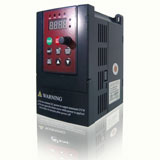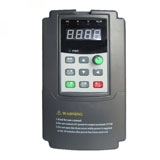How to choose electric motor for frequency inverter?
The key to know which electric motor is better to use on frequency inverter depends entirely on the individual application for which it will be used.
You need to ask questions such as: 1. what will the cable distance be between the frequency inverter and the motor? 2. What is the system voltage? 3. What is the rise time of the inverter's output IGBTs? 4. Is the load constant torque, variable torque or constant horsepower? 5. What speed range is required? 5. Will the AC motor always be powered by the frequency inverter or is across-the-line bypass required? 6. What is the motor's nameplate voltage and frequency rating? 7. What is the horsepower or kW rating of the electric motor? 8. Will the conductors between the motor and the frequency inverter be shielded or non-shielded? 9. What type of raceway will be used for the conductors between the frequency inverter and the motor?
For systems that are rated for 220 volts generally do not have a problem with reflected waves because the motor insulation systems are generally rated for 600V systems anyway. Reflected waves on 220V systems would have peak voltages no greater than 650 to 1000 volts.
On 380V or higher systems, if the cable distance between the frequency inverter and the motor is relatively short (typically 25 feet or less) then there need not be any concern about reflected waves damaging the motor insulation. On retrofit situations where you need to re-use an existing motor and you can't determine the peak voltage withstand rating of the motor's insulation system the you can add devices either at the frequency inverter output or at the motor which can prevent reflected wave voltage spike damage.
You need to ask questions such as: 1. what will the cable distance be between the frequency inverter and the motor? 2. What is the system voltage? 3. What is the rise time of the inverter's output IGBTs? 4. Is the load constant torque, variable torque or constant horsepower? 5. What speed range is required? 5. Will the AC motor always be powered by the frequency inverter or is across-the-line bypass required? 6. What is the motor's nameplate voltage and frequency rating? 7. What is the horsepower or kW rating of the electric motor? 8. Will the conductors between the motor and the frequency inverter be shielded or non-shielded? 9. What type of raceway will be used for the conductors between the frequency inverter and the motor?
For systems that are rated for 220 volts generally do not have a problem with reflected waves because the motor insulation systems are generally rated for 600V systems anyway. Reflected waves on 220V systems would have peak voltages no greater than 650 to 1000 volts.
On 380V or higher systems, if the cable distance between the frequency inverter and the motor is relatively short (typically 25 feet or less) then there need not be any concern about reflected waves damaging the motor insulation. On retrofit situations where you need to re-use an existing motor and you can't determine the peak voltage withstand rating of the motor's insulation system the you can add devices either at the frequency inverter output or at the motor which can prevent reflected wave voltage spike damage.

 High quality frequency inverters for electric motor speed controls in energy-saving solutions.
High quality frequency inverters for electric motor speed controls in energy-saving solutions.

